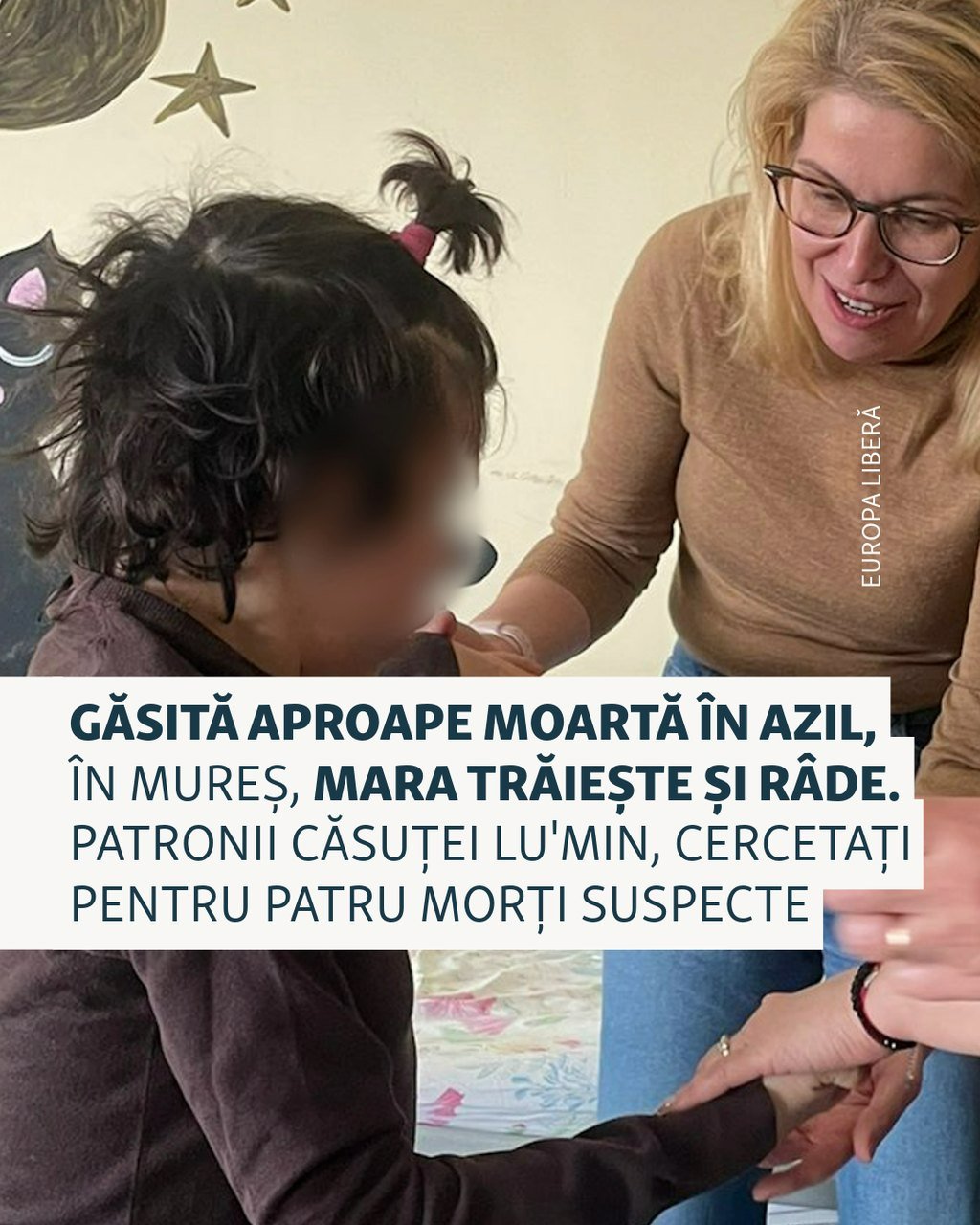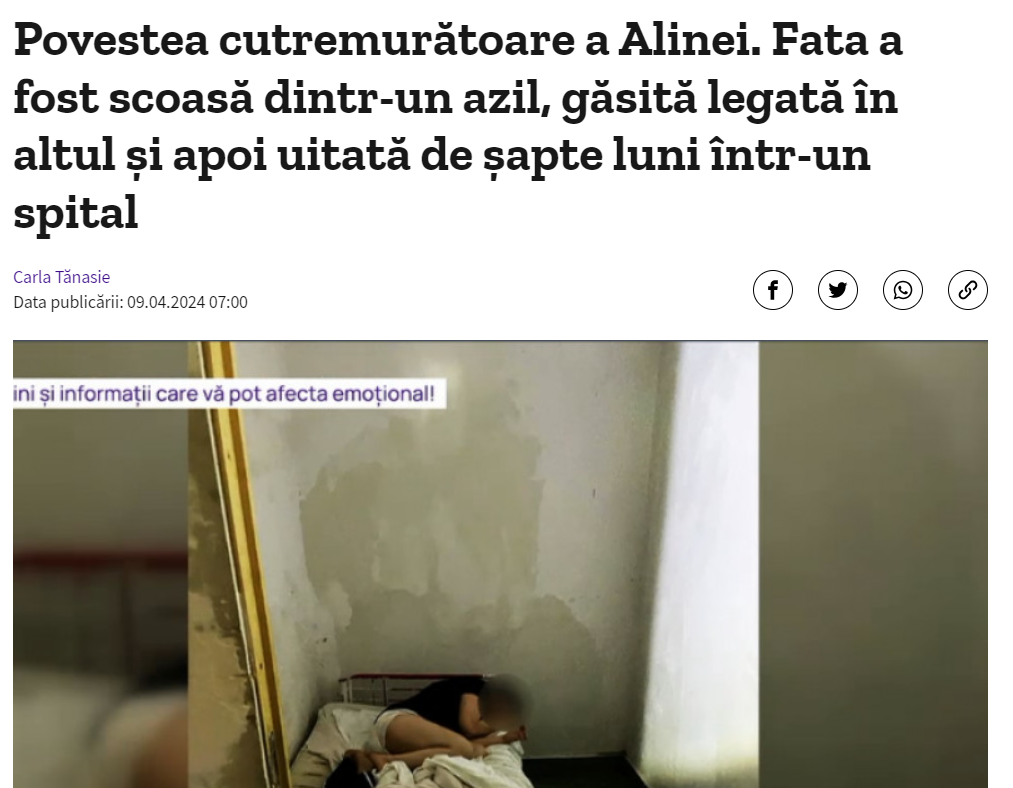February, 2025 – Digi24
From family to institution. State abuse under the guise of protection in the case of the children from Mures: separated from their parents due to the “absence of services in the community”. Watch the Digi24 coverage:
Interviews concerning the situation of the children with disabilities, institutionalised in Mureș County
What will happen to the 63 children with disabilities in centers in Târgu-Mureș? Centre for Legal Resources has drawn public attention to the inhumane conditions in which these children are being kept. The Social Inspectorate says specific solutions must be found for each child. What does that mean? Andreea Orosz spoke to Georgiana Pascu from CLR and Doru Constantin, spokesperson at DGASPC Mureș.
On January 13, Georgiana Pascu, program manager at Advocate for Dignity, spoke with journalist Vitalie Cojocari from Euronews about the situation documented by CLR in the foster care centers for children with disabilities in Mures County during the program Voices that Matter:
Advocate for Dignity program manager Georgiana Pascu’s intervention on the program Prim-plan obiectiv, about the lack of adequate services for children and the CLR’s recommendations.
Georgiana Pascu discusses CLR’s findings at the foster care centers for children in Mureș county for Antena3.
Read about the context HERE.
17.12.2024 – Focus, TVR Cluj
This year, the Parliamentary Assembly of the Council of Europe passed unanimously a resolution that member states should recognize abuse in their countries, provide financial compensation to those affected, undertake a comprehensive reassessment and improve work to prevent abuse. “In Europe, the abuse of children, whether they are victims of sexual predators, violence or mistreatment in public, private or religious institutions – which should be safe havens – must never again be ignored,” says Council of Europe Resolution 2533. This resolution is a major change for Europe”, says Guido Fluri, President of the Justice Initiative: “In Switzerland, thanks to the consistent processing of the files of 12,000 victims of abuse, justice has been partly done. Now it is time for survivors of abuse in the rest of Europe to get justice too.”
Romanian parliamentarians and governments will have to recognize the suffering endured by survivors of abuse in communist care institutions and in the years that followed. For Resolution 2533 (2024) to be implemented, the parliament will have to pass a law formally apologizing to past and present victims, investing in research into the causes that led to the abuses in communist orphanages and providing compensation to survivors. The government must support abuse prevention and public awareness-raising, including by enabling and funding unannounced monitoring by human rights and survivor NGOs of all institutions where children are placed, to minimize risks and respond quickly to abuse. We extend our thanks to the Institute for the Investigation of Crimes of Communism and the Legal Resource Center for their participation and their very well researched and unequivocally expressed message in support of victims in protection institutions.
Justice Initiative Romania
8.10.2024
The “A System in Therapy” dossier, documented by Snoop.ro journalists, explores the mental health system in Romania, with all its pitfalls and improvisations. The third episode in the series examines “Romania’s own recipe for deinstitutionalization”:
“What is still lacking is an overlapping of these systems: the social assistance and child protection system and the psychiatric and health systems (…) It can be an institution with 100, 50 or 10 places. There’s no point putting ‘sheltered housing’ or ‘family-type home’ on the door, if you have staff working shifts, if people can’t make any decisions about what they eat, where they work, when they can walk out the door, there is an institution. You and I, if we want to walk out the door, we don’t call anyone to give us permission” – Georgiana Pascu, program manager Advocate for Dignity by CRJ.

2.10.2024

10.04.2024

9.04.2024

26.07.2023
15.07.2023
În fața ta – Digi24
1.04.2023
Fără prejudecăți, TVR Cluj
8.11.2022
Dincolo de Alb și Negru, TVR 1
06.10.2014
“Recovery death camps prisoners: People bound with chains, without water and heat, while authorities make strategies” – TV documentary on Romanian ProTV channel, for the “România, Te iubesc” TV show
“In 2004, in the resolution regarding Romania’s adhering to the European Union, Romania was committing to give special attention to the abandoned children and youth, by taking them out of institutions. Ten years later we have approximately 700 institutions pompously called “Centers for Recovery and Rehabilitation” or of “Care and Assistance” of persons with handicaps, and that host 17.000 adults and 7.000 children. They look like concentration camps or death camps, hidden from people’s eyesight and where free access is denied by the authorities, and in which once you get in as a patient, you get out only by death. Images filmed with the hidden camera in 9 such institutions show that after 24 years since the opening of the extermination camps of children with disabilities, Romania is still handicapped when it comes to giving them a chance to a decent life.”
See the documentary here or on the show’s page.
17.04.2014
“Europe’s Hidden Shame” – An undercover investigation conducted by Al Jazeera reveals disturbing evidence about the abuse of disabled people in Romania.
Watch here or on YouTube. Find out more on Al Jazeera page: Europe’s Hidden Shame.
1 year ago
“Opening the Courtroom Doors for People with Disabilities” – A New Media Advocacy Project
Watch here or on Vimeo. Find out more about New Media Advocacy Project’s work here.
19.05.2013
“Unrecoverable Romania” – TV documentary by Antena 3 Romanian TV channel, for “În Premieră” TV show
“23 years have passed since the West discovered the Romanian ‘horror orphanages’. The children then considered by the system ‘unrecoverable’ have become adults, each of them with their fate, depending of the country it has lived. We invite you to discover how some have been saved by love and how others were condemned to a ‘unrecoverable’ mentality.”
Watch it here, on YouTube or on Antena 3’s website.
